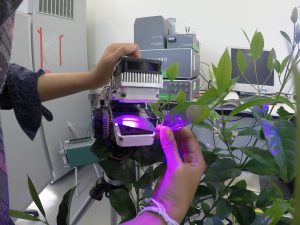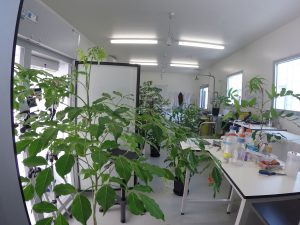Tropical Leaves – Why so Lazy?
I study leaves, in particular tropical leaves. These flimsy, flat greenish creatures might look boring to most people, but they quietly power life on earth.
All living things need oxygen to survive, and their carbon ‘poo’ from breath need to be cleaned. Not only leaves clean the air by absorbing carbon via photosynthesis, leaves release oxygen and make sugar that is later converted to all delicious food we eat.
Photosynthesis also releases water vapours that help cool the air, another justification as to why we should not chop more trees than we already did. Since we learn to dig and make use of carbon from fossils – thus releasing this stored carbon to atmosphere and creating heat blanket; forests are becoming more significant than ever to prevent us from cooking ourselves to death.

My research shows that tropical leaves are lazy. To be precise, they only work half of their temperate counterparts. On average, tropical leaves soak 40 carbon dioxide molecule per second, whereas temperate leaves absorb 80 (note that the uncertainty is huge though). This means, if you measure leaves from Malaysia versus Europe, you will find that the Malaysian leaves have slower rate of photosynthesis than those Europeans.
To make thing worse, tropical leaves usually stop working and go to sleep after 12pm. If you try to measure Malaysian leaves during lunch, they give you zero reading, which is why I had to cram all my experiments in the morning when they are still awake and happy photosynthesising!!

Why are they so lazy lah?
Turns out that there are numerous ecological and evolutionary advantages of being lazy tropical leaves. In tropical regions, sunlight is in abundance and available all year round so this is not a limiting factor for our tropical workers. In temperate areas, seasonal changes cause the leaves to maximize working hours during summer and hibernate during winter, when many temperate leaves are shed.
Another very important reason is survival. In the tropics, you see insects everywhere and these flying bugs and crawling caterpillars eat leaves! Hence, tropical leaves are evolved to put their resources in defence rather than fixing more carbon. This explains why tropical leaves emit various kinds of interesting smell when crushed; this smell indicates the presence of secondary metabolites that are used for deterring insects. Malaysians aunties make full use of this evolutionary adaptation by adding citrusy leaves (kaffir lime, lemongrass) to their cooking.
In addition, since tropical leaves invested more resources in defence, they live longer (3-5 years) and thus can catch up with their temperate counterparts which usually only last for a season. Hence, tropical and temperate leaves have similar rate of photosynthesis when we integrate the amount of carbon dioxide being absorbed by tropical and temperate species during their lifetime.
From my study, I learn that nature is all about balance and harmony. There is always something exciting to be discovered and further discovery allows us to explain why things are the way they are.
See my recent paper: Bahar, N. H., Hayes, L., Scafaro, A. P., Atkin, O. K. and Evans, J. R. (2018), Mesophyll conductance does not contribute to greater photosynthetic rate per unit nitrogen in temperate compared with tropical evergreen wet‐forest tree leaves. New Phytol, 218: 492-505.

Dr. Nur Hazwani Bahar obtained her doctorate in plant physiology from the Australian National University. She inspires to safeguard tropical rain forest while enjoying good things in life.
Contact info: nur.abdulbahar@gmail.com





Oh god i finally found someone as crazy as me. I mean in Malaysia lah. People was asking why on earth I am obsessing myself with leaves! Especially the underated groups pteridophyte and bryophyte. It is hard to start your research when you knows no one back home!